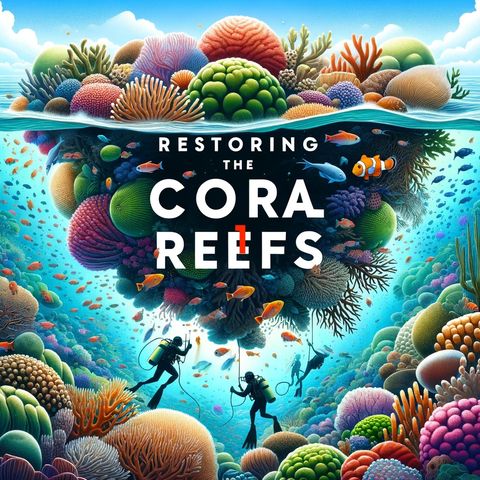
Contacts
Info
Beneath the shimmering surface of our oceans lies a hidden metropolis, a riot of color and life known as a coral reef. These vibrant underwater cities are teeming with an...
show moreThe team measured carbonate budgets at Mars reef restoration sites that had been restored a few months, one year, two years, and four years prior, as well as on degraded and healthy control sites. The results were astonishing, with coral cover, coral colony sizes, and carbonate production rates tripling in the years following coral transplantation. Remarkably, after four years, the restoration sites were indistinguishable from nearby healthy reefs in all investigated parameters.
Dr Ines Lange, the lead author from the University of Exeter, emphasized the significance of the findings, stating, "The speed of recovery we saw is incredible. While reef restoration cannot solve the problem that reefs are severely threatened by climate change, it shows that active management actions can help to boost the resilience of specific reefs, and bring back important functions that are critical for marine life and local communities." However, the researchers noted that the community composition on restoration sites differs from healthy reefs, as transplanted coral fragments are a mix of different branching coral types, while healthy reefs also harbor many boulder-like and encrusting corals. This difference may impact habitat provision for larger marine species and resilience to future heatwaves, as branching corals are more sensitive to bleaching. Dr Tim Lamont from Lancaster University, who initiated the research collaboration, added, "This is a really encouraging discovery. If we can maintain climate conditions that allow for coral survival, it's possible to restore even very damaged reefs back to healthy, functional systems within relatively short periods of time." The research also fostered a productive partnership between international scientists and local scientists and Masters students in Indonesia, contributing to capacity building for future generations of Indonesian scientists. Dr Tries Razak from BRIN Indonesia commended the collaborative effort, stating, "This collaborative effort not only advances scientific research in Indonesia but also contributes significantly to the capacity building for future generations of Indonesian scientists." The study, titled "Coral restoration can drive rapid reef carbonate budget recovery," is published in Current Biology by Ines Lange, Tries Razak, Chris Perry, Permas Maulana, Mochyudho Prasetya, Irwan, and Timothy Lamont. The findings underscore the importance of active management actions in restoring degraded coral reefs and the potential for international collaboration in advancing scientific research and capacity building in this field. Thanks for listening to Quiet Please. Remember to like and share wherever you get your podcasts.

Beneath the shimmering surface of our oceans lies a hidden metropolis, a riot of color and life known as a coral reef. These vibrant underwater cities are teeming with an...
show moreThe team measured carbonate budgets at Mars reef restoration sites that had been restored a few months, one year, two years, and four years prior, as well as on degraded and healthy control sites. The results were astonishing, with coral cover, coral colony sizes, and carbonate production rates tripling in the years following coral transplantation. Remarkably, after four years, the restoration sites were indistinguishable from nearby healthy reefs in all investigated parameters.
Dr Ines Lange, the lead author from the University of Exeter, emphasized the significance of the findings, stating, "The speed of recovery we saw is incredible. While reef restoration cannot solve the problem that reefs are severely threatened by climate change, it shows that active management actions can help to boost the resilience of specific reefs, and bring back important functions that are critical for marine life and local communities." However, the researchers noted that the community composition on restoration sites differs from healthy reefs, as transplanted coral fragments are a mix of different branching coral types, while healthy reefs also harbor many boulder-like and encrusting corals. This difference may impact habitat provision for larger marine species and resilience to future heatwaves, as branching corals are more sensitive to bleaching. Dr Tim Lamont from Lancaster University, who initiated the research collaboration, added, "This is a really encouraging discovery. If we can maintain climate conditions that allow for coral survival, it's possible to restore even very damaged reefs back to healthy, functional systems within relatively short periods of time." The research also fostered a productive partnership between international scientists and local scientists and Masters students in Indonesia, contributing to capacity building for future generations of Indonesian scientists. Dr Tries Razak from BRIN Indonesia commended the collaborative effort, stating, "This collaborative effort not only advances scientific research in Indonesia but also contributes significantly to the capacity building for future generations of Indonesian scientists." The study, titled "Coral restoration can drive rapid reef carbonate budget recovery," is published in Current Biology by Ines Lange, Tries Razak, Chris Perry, Permas Maulana, Mochyudho Prasetya, Irwan, and Timothy Lamont. The findings underscore the importance of active management actions in restoring degraded coral reefs and the potential for international collaboration in advancing scientific research and capacity building in this field. Thanks for listening to Quiet Please. Remember to like and share wherever you get your podcasts.
Information
| Author | QP-3 |
| Organization | William Corbin |
| Categories | Tech News , Education , Earth Sciences |
| Website | - |
| corboo@mac.com |
Copyright 2024 - Spreaker Inc. an iHeartMedia Company
